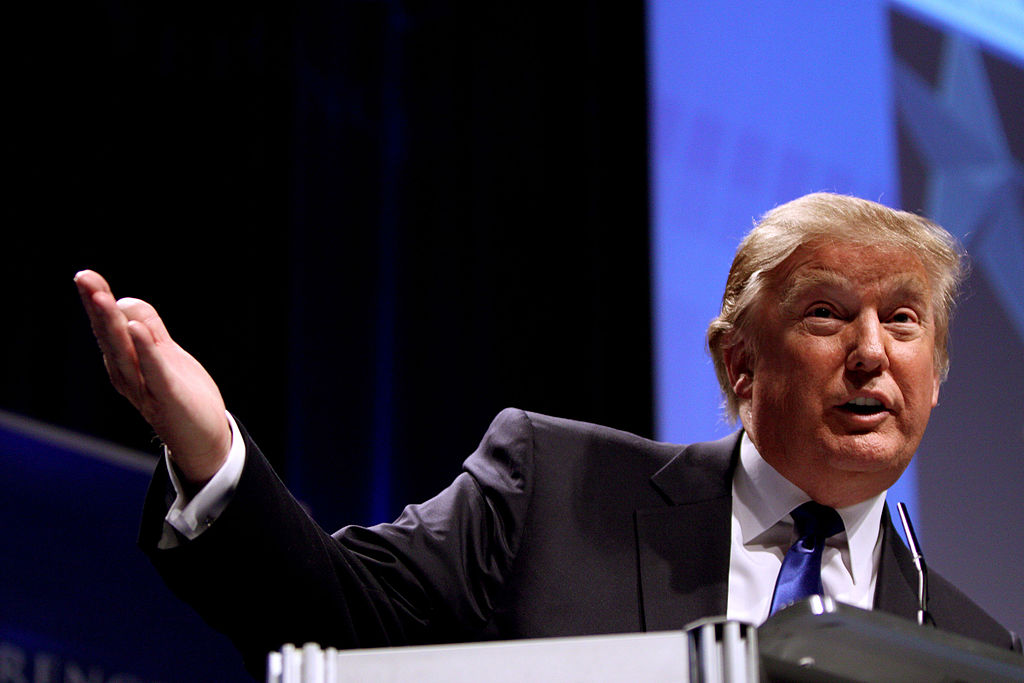In Praise of the President’s Iran Tweets
The president’s statements on Iran represent a dramatic improvement in the quality of his argument.

Published by The Lawfare Institute
in Cooperation With

I want to say a few words in defense of Donald Trump’s tweets and statements today on the abortive military operation against Iran. This is admittedly contrarian. It is an argument I have never made before and frankly don’t expect to make again. It is also an almost comical example of damning with faint praise.
First, some important caveats. The president’s set of four tweets are only modestly more appropriate than his usual public statements; presidents shouldn’t ever be tweeting about their thinking concerning the launch of military operations at all. And his tweets about Iran over the last two days are a good example of why. Yesterday, he tweeted that “Iran made a very big mistake” in shooting down the drone—a comment that led many people to assume that retaliatory military action was imminent. In the tweets this morning, Trump’s account of U.S.-Iranian relations under both his administration and the Obama administration is reductionist, partisan, and in important respects, just silly. His facts are inherently suspect—because, well, all facts articulated by Trump are unreliable. And the quality of Trump’s argumentation is collegiate at best.
But all that said, collegiate-level argumentation is a dramatic breakthrough for a president whose more typical behavior has given rise to Dan Drezner’s famous Toddler-in-Chief thread. The president’s comments on the Iranian situation reflect thinking that is genuinely unusual for Trump, who normally articulates a kind of government by magic in which one can have it all and without costs. Here, by contrast, Trump is overtly acknowledging costs, nuance and complexity. The man who campaigned for president promising to commit war crimes is now acknowledging that brutality isn’t an objective but a negative and that restraint may be valuable. I cannot think of any previous set of statements in which Trump’s thinking seems so coherent and linear and logical—and also so complicated.
Here’s what he said:
President Obama made a desperate and terrible deal with Iran - Gave them 150 Billion Dollars plus I.8 Billion Dollars in CASH! Iran was in big trouble and he bailed them out. Gave them a free path to Nuclear Weapons, and SOON. Instead of saying thank you, Iran yelled.....
— Donald J. Trump (@realDonaldTrump) June 21, 2019
....Death to America. I terminated deal, which was not even ratified by Congress, and imposed strong sanctions. They are a much weakened nation today than at the beginning of my Presidency, when they were causing major problems throughout the Middle East. Now they are Bust!....
— Donald J. Trump (@realDonaldTrump) June 21, 2019
....On Monday they shot down an unmanned drone flying in International Waters. We were cocked & loaded to retaliate last night on 3 different sights when I asked, how many will die. 150 people, sir, was the answer from a General. 10 minutes before the strike I stopped it, not....
— Donald J. Trump (@realDonaldTrump) June 21, 2019
....proportionate to shooting down an unmanned drone. I am in no hurry, our Military is rebuilt, new, and ready to go, by far the best in the world. Sanctions are biting & more added last night. Iran can NEVER have Nuclear Weapons, not against the USA, and not against the WORLD!
— Donald J. Trump (@realDonaldTrump) June 21, 2019
Trump later elaborated in an interview with NBC’s Chuck Todd:
He told NBC on Friday that a plan was "ready to go, subject my approval."
Trump said that before he issued a final decision, he asked his generals, "I want to know something before you go. How many people would be killed, in this case Iranians?"
The generals said approximately 150 people would be killed, the president said.
"I thought about it for a second and I said, you know what, they shot down an unmanned drone, plane, whatever you want to call it, and here we are sitting with a 150 dead people that would have taken place probably within a half an hour after I said go ahead," Trump said "And I didn’t like it, I didn’t think, I didn't think it was proportionate."
Note the trajectory of Trump’s argument. He starts by criticizing the Obama administration’s Iran policy and defending his own policy change in response to its supposed failure. He then trumpets his renewed economic sanctions against Iran as the cornerstone of his policy and posits its effectiveness in bringing Iran to its knees. (Color me skeptical about either of these propositions, but arguing Iran policy is not my point here.) He then goes on to articulate a basis for the proposed military action (“On Monday they shot down an unmanned drone flying in International Waters”) and states that a retaliatory operation was ready to go.
And then Trump does something remarkable—at least for him: he acknowledges countervailing interests and allows these countervailing interests to restrain him and induce reliance on less dramatic policy levers. The specific concern he articulates is the casualty count and whether the proposed strike would be proportionate given that the Iranians downed only an unmanned drone. In doing so, he nods—discernibly, if vaguely—to important international law principles, in contrast to copious earlier statements suggesting that the law of war is for suckers and celebrating “tough” actions.
Trump then takes an additional interesting step: he keeps the military options in reserve (“I am in no hurry, our Military is rebuilt, new, and ready to go, by far the best in the world”) and reiterates that the principal engine of U.S. policy here remains economic pressure (“Sanctions are biting; more added last night”). The Washington Post reports that the administration did not actually impose any new sanctions, but never mind that for now.
There is no magical thinking here. There is, rather, a coherent argument in which the U.S. can’t have it all, there are costs to contemplated actions, and the best alternative may be neither some great summit and an exchange of love letters nor “fire and fury” belligerence but, rather, the steady application of non-military pressure with possible military action as backup.
Color me impressed—if only mildly, and only in comparison to the previous level of discourse we have seen from the president.
In the wake of Trump’s comments, people are positing all sorts of explanations both for the underlying events Trump described and for the president’s statements about them. For example, CNN reporter Daniel Dale notes that the particular formulation Trump used in his tweets tracks with a particular genre of story he tells on the campaign trail, the “overwhelming majority” of which have been inaccurate. The New York Times points out that Trump’s account of receiving details about casualties only at the last minute is inconsistent with the usual decision-making processes prior to military action. The Middlebury Institute’s Jeffrey Lewis suggests that Trump may be, in his own way, following a playbook also used by Richard Nixon: announcing that he decided against retaliation at the last minute in order to seem tough, when in fact retaliation was never really on the table.
The suspicions may well prove correct. Trump could be lying about some or all of the relevant facts. But for present purposes, that actually doesn’t matter. The relevant point is that he has made a public argument for complexity. It’s not a great argument. It’s not a particularly sophisticated argument. And it’s not an argument that should be made on Twitter. But it is an argument by Donald J. Trump for restraint on grounds that there are multiple interests at stake, there are obligations beyond merely “winning,” that scalpels can be more effective than sledgehammers, and there is no such thing as magic.
This is an area in which Trump is genuinely torn, in which his tendency towards belligerence and can-do machismo clashes directly with his deep instinct toward isolationism and his corresponding lack of interest in new overseas military adventures. The conflict between these two instincts leads to Trump hiring John Bolton but also having chummy summits with Kim Jong Un and make clear he has no interest in Bolton’s enthusiasm for war with Iran. He scraps the Iran deal and lets tensions escalate but also seems sincerely skeptical about anything like war. Up until now, he has resolved these paradoxes by simply announcing outcomes he will achieve by force of will. He’ll get a better deal with Iran. North Korea will suddenly decide that the highest ambition of juche is actually real estate development along the country’s coast.
I don’t want to credit Trump growth in office because of only a single series of statements and tweets in the midst of a single badly-handled international crisis for which Trump himself bears considerable responsibility. I don’t believe Trump is emotionally capable of growth. And it would take a lot more evidence of increased sophistication of argumentation to make me even entertain the idea that that’s the explanation.
But the statements today reflect a dramatic improvement over Trump’s normal mode of argumentation. And I do think that’s worth noting.
Yes, that’s damning with faint praise. But the change in Trump’s rhetoric is welcome, if only for its having warranted for the first time such backhanded congratulations.





